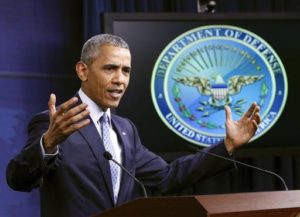by WorldTribune Staff, September 1, 2016
U.S. President Barack Obama has yet to forge a “sound strategy” in the fight against Islamic State of Iraq and Levant (ISIL) and lacks the “political will” to take advice from his military commanders, a group of former military officials said in a report.
“At the end of the day, our current U.S. policy in the region has failed expensively and shredded our credibility,” Barry McCaffrey, a retired Army general who led an Army division into Iraq in 1991’s Gulf War, said in the Time report.

James Mattis, a retired Marine general who served under Obama when he headed up Central Command from 2010 to 2013, says the war against ISIL is “unguided by a sustained policy or sound strategy [and is] replete with half-measures.”
That strategy, one former official said, has allowed ISIL to remain in control of its main strongholds in Syria (Raqqa) and Mosul (Iraq) for several years. Obama administration officials have said an offensive to retake Mosul may begin by year’s end. Originally, the Pentagon said it would launch an effort to liberate Iraq’s largest city in April 2015.
“I’ve talked to some U.S. generals who are really frustrated — they could be in Raqqa in a week,” said Anthony Zinni, a retired Marine four-star general who was chief at Central Command from 1997 to 2000. The U.S. is “losing credibility and they’re actually encouraging the enemy because they’re able to hold the ground for years now.”
Zinni added he wouldn’t want “to be part of a strategy that in my heart of hearts I know is going to fail. It’s a bad strategy, it’s the wrong strategy, and maybe I would tell the president that he would be better served to find somebody who believes in it, whoever that idiot may be.”
The U.S.-led war is now in its third year and “a comprehensive strategy to rapidly decompose the Islamic State is still lacking,” said David Deptula, a retired Air Force lieutenant general who planned the 1991 bombing campaign that drove Iraqi forces out of Kuwait. “Employing an anemic application of force relative to previous air campaigns has yielded the Islamic State time to export their message, garner followers, and spread their message.”
The U.S. initially said the fight to defeat ISIL would take at least three years, but current commanders have said their progress is limited by the lack of local ground forces to retake territory from the terror organizations.
“There is no political will in the White House to even listen to serious recommendations from military commands,” says Derek Harvey, a retired Army military-intelligence colonel who spent much of his career in Iraq. “The original strategy explained by the president was barely adequate and even that was not resourced or executed well. First and foremost are we going to be decisive and have some balls, or just continue to try to manage conflict to unacceptable ends. If not the former, then we should not play in the sandbox.”
Daniel Bolger, a retired Army three-star general who commanded troops in both Afghanistan and Iraq before retiring in 2013, said that “doing nothing would be far preferable to this mess.”
When asked about Obama’s strategy, Bolger, who teaches military history at North Carolina State University, referred to a quote from a French general after he witnessed the doomed charge of the British Light Brigade against the Russians in the Crimean War in 1854: “It is magnificent, but it is not war,” Pierre Bosquet said. “It is madness.”
